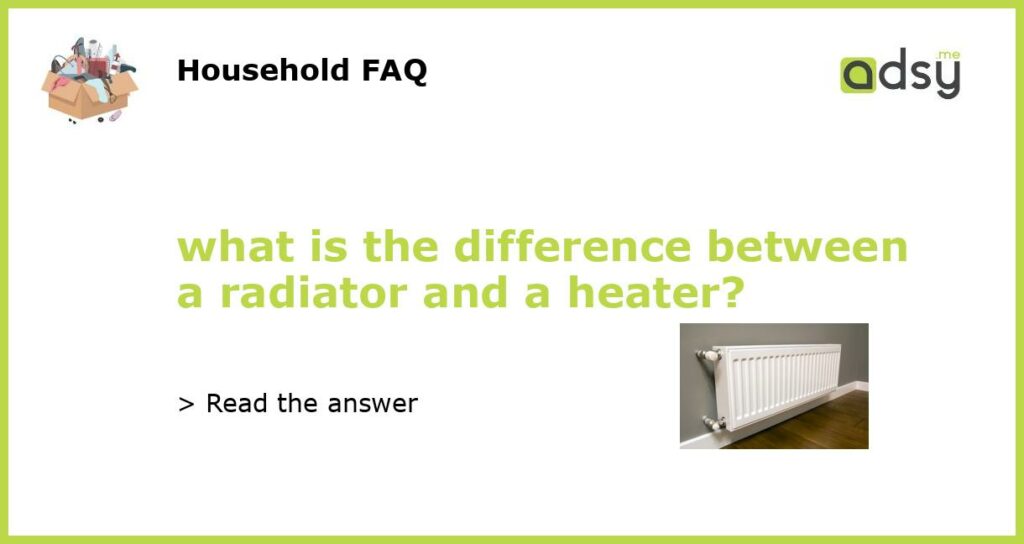The Difference Between a Radiator and a Heater
When it comes to keeping our homes warm and cozy, we often use the terms radiator and heater interchangeably. However, these two heating devices are not the same. While both radiators and heaters serve the purpose of heating a space, they operate in different ways and have different features. In this article, we will explore the key differences between a radiator and a heater.
Radiator
A radiator is a device that is specifically designed to heat a room by transferring heat energy from a heating element to the surrounding environment. Traditional radiators are typically made of metal, such as cast iron or steel, and are connected to a central heating system that generates hot water or steam. The hot water or steam flows through the radiator, heating the metal and radiating heat into the room.
Radiators are commonly found in older homes and buildings with central heating systems. They are usually positioned against a wall and have a series of metal fins or tubes attached to them, which increase the surface area for heat transfer. The heat generated by the radiator rises, creating convection currents that circulate warm air throughout the room.
Heater
A heater, on the other hand, is a more general term that refers to any device or appliance used for heating. Unlike radiators, heaters come in a variety of types and can be powered by different energy sources. Some common types of heaters include electric heaters, gas heaters, and oil heaters.
Electric heaters are the most popular type of heater and are often portable, allowing you to move them from room to room. They work by converting electrical energy into heat energy through the use of heating elements, such as coils or ceramic plates. Electric heaters are typically controlled by a thermostat and offer precise temperature control.
Gas heaters, as the name suggests, rely on natural gas or propane to generate heat. They typically burn fuel to produce a flame that warms the air. Gas heaters are often used in areas with a natural gas supply, such as kitchens or living rooms. They often require ventilation to safely remove any combustion byproducts from the indoor environment.
Oil heaters, also known as oil-filled radiators, operate by heating a reservoir of oil and transferring the heat to the surrounding area. They are filled with a special oil that has a high heat-retaining capacity. Oil heaters are often used in bedrooms or living rooms because they provide a consistent and steady source of heat.
Efficiency and Energy Consumption
One of the key differences between radiators and heaters is their efficiency and energy consumption. Traditional radiators tend to be more energy-efficient than electric heaters because they rely on hot water or steam produced by a central heating system. This central heating system is powered by a boiler, which can be fueled by natural gas, oil, or electricity. These systems are designed to heat multiple rooms, making them more efficient for heating larger spaces.
On the other hand, electric heaters are generally less efficient because they convert electrical energy directly into heat. However, modern electric heaters are designed with energy-saving features, such as programmable thermostats and timers, which can help reduce energy consumption.
Cost
When it comes to cost, radiators can be more expensive to install initially, especially if you need to retrofit an older home or building. They require a central heating system with a boiler, pipes, and radiators throughout the space. The cost of installation will depend on the size of the space and the complexity of the system.
Heaters, on the other hand, are generally more affordable and accessible. Electric heaters, in particular, are often inexpensive and widely available. Gas and oil heaters may require professional installation and regular maintenance, which can add to the overall cost.
Maintenance and Safety
Maintenance and safety are important considerations when choosing between a radiator and a heater. Radiators require minimal maintenance beyond occasional cleaning and checking for leaks. They are considered safe as long as the central heating system is properly maintained and operated.
Heaters, especially gas and oil heaters, may require more maintenance and regular inspections to ensure safety. Gas heaters, for example, should be inspected annually for any leaks or combustion issues. Electric heaters are generally considered safer as they do not produce an open flame or emit carbon monoxide.
In summary, while radiators and heaters both provide heat, they differ in terms of how they operate, their efficiency, cost, and maintenance requirements. Radiators are a specific type of heating device that relies on hot water or steam from a central heating system, while heaters encompass various types and energy sources. The choice between a radiator and a heater will depend on your specific heating needs, budget, and preferences.






